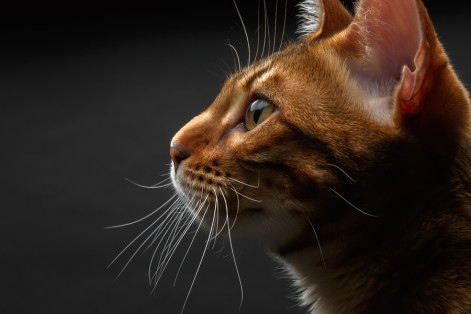
(Photo Credit: Seregraff, Bigstock.com)
One of the most common questions veterinarians receive about older pets is whether or not a symptom, behavior or physical change is normal. Because our pets can’t talk, solving these dilemmas requires a thorough review of the pet’s medical history, a veterinary examination and diagnostic tests. Many pet owners complain their senior cat is sluggish, doesn’t act as sharp, lacks an interest in playing or is sleeping more. These and other ailments are associated with diminished mental or sensory abilities, or what veterinarians call cognitive dysfunction in cats.
Mind Over (Grey) Matter
As pets grow older, the changes that come with age involve more than just greying muzzles. Behavioral changes – like a cat who suddenly “forgets” where her litter box is, or a normally pleasant pet who starts howling at night – can hint at cognitive dysfunction. Disorientation, changes in sleeping habits, wandering and changes in the way a pet reacts to family members can also clue a veterinarian in to mental matters.
Although about 30% of cats between the ages of 11-14 (and more than 50% of cats over 15) develop cognitive dysfunction, diagnosing the problem first requires ruling out other medical conditions. The most common conditions that can cause similar symptoms in geriatric pets are:
- overactive thyroid
- arthritis
- loss of vision or hearing
- diabetes
- kidney disease
- high blood pressure
- degenerative joint disease
Before your appointment, you may want to record the details of your pet’s behavior changes as you observe them – even seemingly insignificant information can sometimes clue your veterinarian in to what’s going on. If declining cognition is determined to be the problem after other diagnostic tests come back clear, your veterinarian will work with you on a treatment plan to give kitty’s brain a boost. Some “mental helpers” he or she may suggest include:
- Adding antioxidants and essential fatty acids to your cat’s diet to help combat cognitive decline.
- Giving kitty a mental workout using games, food puzzles and hunting activities to make the environment more stimulating.
- Keeping changes in your home to a minimum. For some cats, something as simple as moving their bed or food bowl can cause stress and add to confusion.
- If the cognitive decline is advanced, prescription medications may help.
Think Your Cat Has Feline Cognitive Dysfunction?
Figuring out whether changes in your pet are due to age or ailment can be a challenge, but you should never ignore a behavior that doesn’t “seem right.” Modern veterinary medicine includes many options to keep cats comfortable and free from pain and anxiety. If your senior feline is showing symptoms of cognitive dysfunction, talk to your veterinarian about ways you can help.
Let Us Help
As a concerned pet parent, we know that you want the best for your cat. Petplan Pet Insurance offers friends of Fetch! Pet Care a special discount on all new policies. Just click this link to visit Petplan’s website to start saving money on vet bills right away!
Source: Read Full Article



